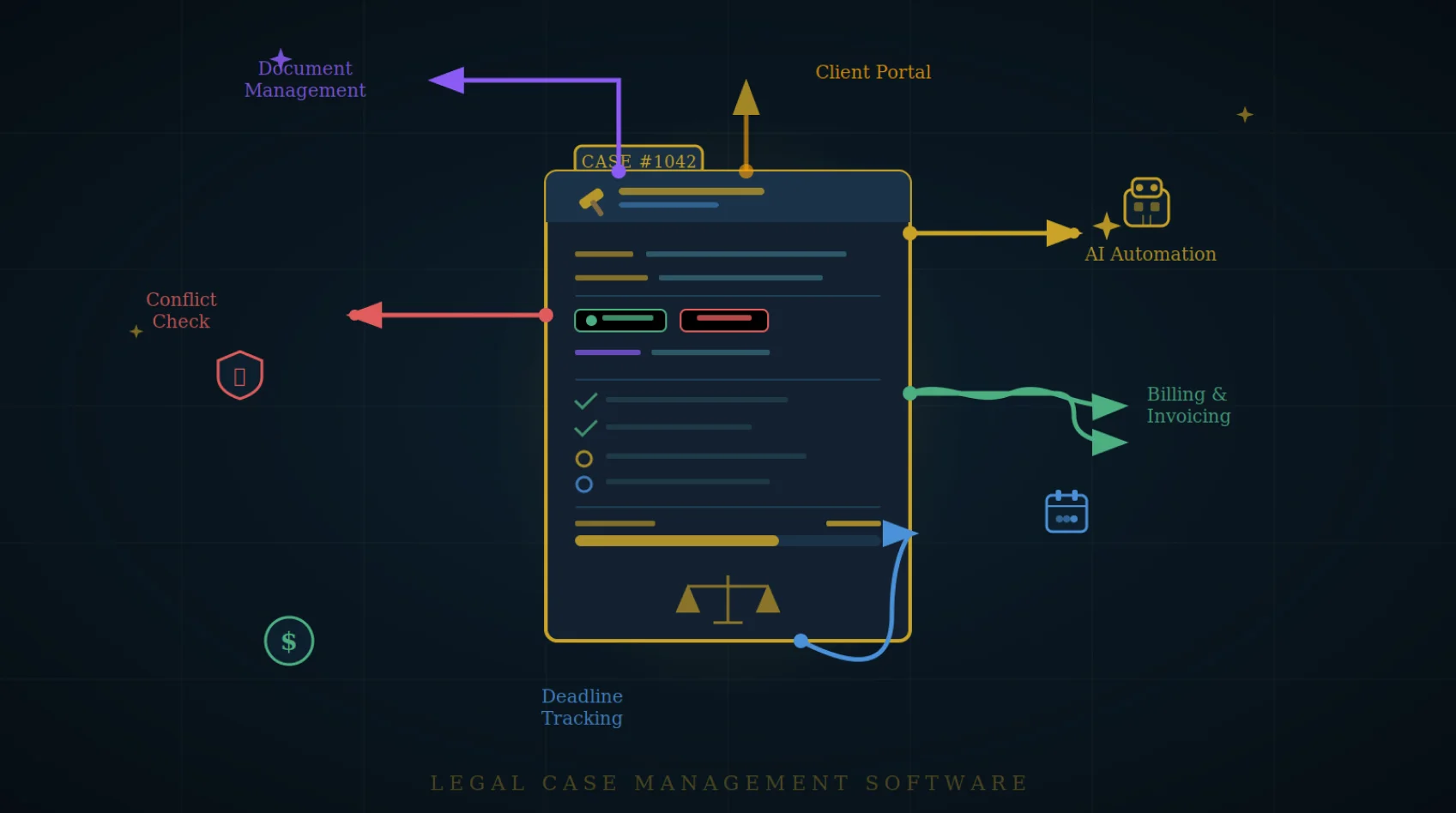Law Firm Finances: Bookkeeper vs. Accountant — Who Handles What?
Managing business finances in a law firm is critical to long-term growth and compliance. Financial professionals like bookkeepers and accountants play vital roles in maintaining accurate financial records and providing valuable insight into your business's financial health. However, many law firm owners confuse their responsibilities. This blog outlines the key differences between bookkeepers and accountants, what tasks each handles, and when you may need both a bookkeeper and an accountant to keep your finances organized.
Understanding the Bookkeeper's Role in Law Firm Business Finances
Professional bookkeepers focus on daily financial transactions, ensuring that financial data is accurately tracked in accounting software. Their tasks are essential for maintaining ethical financial practices and building a foundation for deeper financial analysis.
- Recording Financial Transactions: Bookkeepers handle recording business transactions like client payments, office purchases, and processing payroll. These entries ensure your general ledger stays current.
- Accounts Payable and Receivable: They manage outgoing and incoming payments, ensuring vendors are paid and clients are billed efficiently.
- Bank Statement Reconciliations: Bookkeepers regularly reconcile bank statements to catch errors or unauthorized transactions.
- Generating Financial Reports: They generate income statements, business expense reports, and basic cash flow summaries.
- Handling Trust Accounting: For law firms, trust accounting and IOLTA compliance are critical. Bookkeepers keep these financial records accurate and compliant.
- Using Accounting Software: Bookkeepers rely on platforms like QuickBooks to streamline the accounting process and ensure consistent documentation.
Bookkeepers are often the first financial professionals law firms hire. Their work enables strategic decision-making by ensuring that daily financial records are clean and reliable.
Understanding the Accountant’s Role in Law Firm Business Finances
Accountants are responsible for interpreting financial data and providing strategic direction. Their work builds on what bookkeepers maintain.
- Tax Planning and Preparation: Accountants help reduce tax liability through deductions and provide tax advice to guide your firm through tax season.
- Financial Forecasts and Insights: Using historical and current data, accountants develop financial forecasts for business planning and risk assessment.
- Conduct Audits and Ensure Compliance: Accountants ensure legal compliance by conducting internal audits and preparing accurate tax filings.
- Support in Financial Decision-Making: Accountants help business owners assess financial statements, spot trends, and make informed financial decisions.
- Strategic Cash Flow Planning: They help law firms plan for long-term cash flow needs and secure business loans when appropriate.
Most accountants hold a bachelor’s degree and often pursue certifications such as CPA (Certified Public Accountant) to provide tax guidance and financial insights.
Accounting and Bookkeeping Tasks: Who Handles What?
Understanding the tasks each financial professional handles helps law firms decide who to hire based on their needs. While both roles are essential for maintaining financial accuracy and compliance, their responsibilities differ significantly in scope and purpose.
Bookkeeping Tasks: Bookkeepers focus on the foundational tasks of recording and organizing financial data. Their work supports daily operations and helps ensure that all business transactions are properly documented.
- Recording daily financial transactions, including invoices, receipts, and client payments
- Reconciling accounts payable and receivable to maintain cash flow accuracy
- Managing payroll, processing employee salaries, and tracking income and expense receipts
- Maintaining the general ledger, ensuring every transaction is recorded under the correct account
- Using accounting software to automate basic financial tasks and improve accuracy
Accounting Tasks: Accountants build on the data managed by bookkeepers, analyzing financial records to help law firms make informed decisions. Their focus is more strategic and often includes compliance and advisory services.
- Preparing and analyzing financial statements such as balance sheets and income statements
- Conducting financial risk assessments to identify potential vulnerabilities
- Filing taxes, offering strategic tax deductions, and advising on long-term tax planning
- Performing financial analysis, forecasting cash flow, and helping with budgeting and investment strategies
- Advising law firm leadership on how to interpret financial data to guide decision-making
Both bookkeepers and accountants rely on reliable accounting software, consistent financial records, and strong communication to ensure smooth financial operations. While they serve different purposes, their work is interdependent and equally vital to a law firm’s success.
Tax Season Preparation: A Team Effort
Tax season can be overwhelming, but a combination of bookkeeping and accounting professionals helps law firms stay organized.
- Bookkeepers: Maintain updated financial documents, ensure accuracy in income statements, and track tax-deductible expenses throughout the year.
- Accountants: Prepare and file tax returns, advise on tax-saving strategies, and ensure compliance with the Internal Revenue Service.
This partnership helps avoid tax penalties and ensures ethical financial practices during peak filing periods.
Bookkeeper vs Accountant: Key Differences
Credentials and Qualifications
Professional certification adds credibility and trust to both roles:
- Bookkeepers: May hold certifications from the National Association of Certified Public Bookkeepers (NACPB) or similar bodies. Their expertise lies in recording accurate data and using accounting software.
- Accountants: Usually hold a bachelor’s degree in accounting. Certified Public Accountants (CPAs) must pass a rigorous exam, ensuring a high level of understanding in finance, tax law, and compliance.
Hiring certified professionals ensures your law firm adheres to ethical financial practices and regulatory standards.
Rates and Fees: Understanding the Cost of Expertise
- Bookkeepers: Typically charge lower fees and may bill hourly, monthly, or per project. Ideal for routine financial tasks like bookkeeping, reconciliation, and tracking income.
- Accountants: Charge higher rates due to their advanced training and responsibilities. Services often include financial risk assessment, preparing tax returns, and providing tax advice.
Consider both your firm's needs and budget when hiring financial professionals.
Why Both a Bookkeeper and an Accountant Benefit Law Firms
Having both roles on your finance team improves operational efficiency and financial decision-making.
- Accurate Financial Records: Bookkeepers keep records clean, while accountants use that data for analysis.
- Tax Filing Confidence: Accountants can prepare accurate tax returns using organized records from professional bookkeepers.
- Financial Health Insights: Accountants provide valuable insight into long-term planning, while bookkeepers manage daily operations.
- Improved Compliance: Trust accounting, cash flow management, and audits are handled smoothly when both roles are present.
This collaboration supports internal audits and provides a clear picture of your business’s financial health.
When Should Law Firms Hire Both?
Hire a Bookkeeper If:
- You need help with daily financial transactions and maintaining financial documents.
- You want to outsource basic financial tasks like bank reconciliations and accounts payable.
Hire an Accountant If:
- You need tax planning, help with business taxes, or strategic advice.
- You're applying for business loans or planning for expansion.
Hire Both If:
- Your law firm is growing or facing complex financial challenges.
- You need full visibility into your financial operations and long-term planning.
- You're preparing for internal audits or reviewing business finances with existing customers.
Virtual Financial Professionals for Law Firms
Outsourcing to virtual professionals gives small business owners flexible access to expertise.
- Cost-Effective: Reduce overhead with remote professionals who offer the same services as in-house staff.
- Flexible Staffing: Scale services up or down based on need.
- Specialized Knowledge: Access bookkeepers and accountants familiar with the legal industry and global markets.
- Same Services: From tracking income and processing payroll to offering strategic tax advice, virtual financial professionals do it all.
You can also consult independent consultants for project-based support or short-term analysis.
Final Thoughts
In small business accounting, understanding the difference between bookkeeper vs accountant is crucial. Bookkeepers focus on accurate data entry and tracking, while accountants provide valuable insight and financial strategy.
Instead of thinking about it as bookkeeper vs accountant, many law firms benefit from hiring both a bookkeeper and an accountant. Together, they handle everything from basic financial tasks to complex financial decisions that impact growth and compliance.
Ready to take control of your law firm’s finances?
Let Legal Soft’s expert virtual bookkeepers handle your trust accounting, daily transactions, and financial reports—so you can focus on what matters most: practicing law.
Book a free consultation today to find out how we can support your firm's financial operations.








